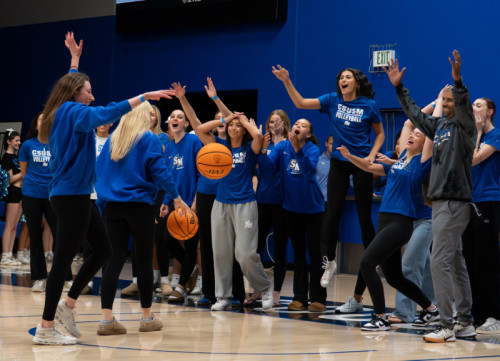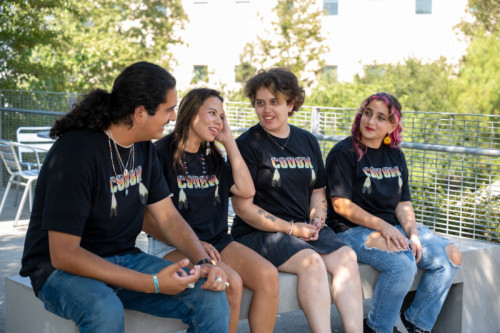 Photo Highlights From Cougar MadnessCal State San Marcos students filled The Sports Center on Oct. 15 for Cougar Madness, the university's annual event celebrating the beginning of the college basketball season. The men's basketball team opens the regular season by hosting Concordia University on Nov. 14. The women's team also opens Nov. 14 with a home game against Azusa Pacific. Visit the athletics website for complete schedules for both teams. Relive some of the event highlights in the Cougar Madness photo slideshow. Media Contact Eric Breier, Interim Assistant Director of Editorial and External Affairs ebreier@csusm.edu | Office: 760-750-7314
Photo Highlights From Cougar MadnessCal State San Marcos students filled The Sports Center on Oct. 15 for Cougar Madness, the university's annual event celebrating the beginning of the college basketball season. The men's basketball team opens the regular season by hosting Concordia University on Nov. 14. The women's team also opens Nov. 14 with a home game against Azusa Pacific. Visit the athletics website for complete schedules for both teams. Relive some of the event highlights in the Cougar Madness photo slideshow. Media Contact Eric Breier, Interim Assistant Director of Editorial and External Affairs ebreier@csusm.edu | Office: 760-750-7314 Seeking Healthy Adults to Participate in Exercise Training StudyHealthy adults ages 18 to 64 who exercise fewer than two days per week are needed to participate in an exercise training study conducted at CSUSM. Participants will complete two sessions per week of exercise for 12 weeks, during which time you must maintain your lifestyle. Upon completion of the study, you will be paid $250. Please email Dr. Todd A. Astorino in the department of kinesiology at astorino@csusm.edu for more information about the study.
Seeking Healthy Adults to Participate in Exercise Training StudyHealthy adults ages 18 to 64 who exercise fewer than two days per week are needed to participate in an exercise training study conducted at CSUSM. Participants will complete two sessions per week of exercise for 12 weeks, during which time you must maintain your lifestyle. Upon completion of the study, you will be paid $250. Please email Dr. Todd A. Astorino in the department of kinesiology at astorino@csusm.edu for more information about the study.
- Photo Highlights From Cougar MadnessCal State San Marcos students filled The Sports Center on Oct. 15 for Cougar Madness, the university's annual event celebrating the beginning of the college basketball season. The men's basketball team opens the regular season by hosting Concordia University on Nov. 14. The women's team also opens Nov. 14 with a home game against Azusa Pacific. Visit the athletics website for complete schedules for both teams. Relive some of the event highlights in the Cougar Madness photo slideshow. Media Contact Eric Breier, Interim Assistant Director of Editorial and External Affairs ebreier@csusm.edu | Office: 760-750-7314

- Seeking Healthy Adults to Participate in Exercise Training StudyHealthy adults ages 18 to 64 who exercise fewer than two days per week are needed to participate in an exercise training study conducted at CSUSM. Participants will complete two sessions per week of exercise for 12 weeks, during which time you must maintain your lifestyle. Upon completion of the study, you will be paid $250. Please email Dr. Todd A. Astorino in the department of kinesiology at astorino@csusm.edu for more information about the study.

- Celebrating Native American Heritage MonthThroughout November, Cal State San Marcos will be celebrating and recognizing the contributions of American Indians with a series of special events as part of Native American Heritage Month. CSUSM invites all members of the campus community to participate in the following events. Pow Wow Dance Workshops Tuesday, Nov. 4, 11, 18, 6-8 p.m., Serenity Circle Learn the history, meaning and movement of pow wow dancing in this interactive workshop led by Kiara Flores. Celebrate culture, community and tradition through dance. Chow on Deck: United in Service – A Celebration of Native American Veterans Tuesday, Nov. 4, noon, Epstein Family Veterans Center deck American Indian Student Center NAHM Kickoff Event Friday, Nov. 7, 5-8 p.m., USU Amphitheater CSUSM’s American Indian Student Center invites the campus community to celebrate the start of Native American Heritage Month. The evening will include traditional bird singing, pow wow dancing and storytelling along with food prepared by Chef Carmen of Island Smoke N’ Grill. CSUSM Second Annual Social Gathering Thursday, Nov. 20, 3-6:30 p.m., Mangrum Track & Field The event will feature traditional bird singers and dancers, along with local vendors showcasing Native art and jewelry. All are welcome to join in this celebration of community and culture. Note: Due to extenuating circumstances, the social gathering will not be held as scheduled on Nov. 20. It will be postponed until the spring or summer of 2026. For inquiries, you can email communityengagement@csusm.edu. Media Contact Eric Breier, Interim Assistant Director of Editorial and External Affairs ebreier@csusm.edu | Office: 760-750-7314

Loading...


